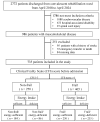Frailty and Energy Intake Deficiency Reduce the Efficiency of Activities of Daily Living in Patients with Musculoskeletal Disorders: A Retrospective Cohort Study
- PMID: 40284199
- PMCID: PMC12030590
- DOI: 10.3390/nu17081334
Frailty and Energy Intake Deficiency Reduce the Efficiency of Activities of Daily Living in Patients with Musculoskeletal Disorders: A Retrospective Cohort Study
Abstract
Background/Objective: This study aimed to investigate the relationship between rehabilitation effectiveness (RE) and pre-admission Clinical Frailty Scale (CFS) scores and energy intake. Methods: This retrospective observational study included 735 patients (81 ± 10 years; male: 27.5%) with musculoskeletal disorders discharged from convalescent rehabilitation wards between April 2018 and April 2024. The patients were classified into four groups based on their CFS scores (non-frail, CFS 1-3; frail, CFS ≥ 4) and rate of energy intake (energy-sufficient vs. energy-deficient). Group comparisons of RE were conducted, and the relationships between the CFS score, energy intake, and RE were analyzed. Results: The RE was significantly lower in the frail/energy-deficient group (53.6 [41.9-78.1]) than in the non-frail/energy-sufficient (78.5 [61.8-90.7]), non-frail/energy-deficient (70.6 [53.4-87.4]), and frail/energy-sufficient (59.9 [41.9-78.1]) groups. Additionally, the frail/energy-sufficient group had significantly lower RE scores than the non-frail/energy-sufficient and non-frail/energy-deficient groups. A multiple linear regression analysis revealed that age, male sex, CFS score, energy intake, handgrip strength, Functional Oral Intake Scale score, Mini Nutritional Assessment-Short Form score, B-type natriuretic peptide, and creatinine were significantly associated with the RE. Conclusions: Both frailty and inadequate energy intake reduce the rate of improvement in activities of daily living in patients with musculoskeletal diseases.
Keywords: activities of daily living; clinical frailty scale; convalescent rehabilitation wards; energy intake; musculoskeletal disorders; rehabilitation.
Conflict of interest statement
The authors declare no conflicts of interest.
Figures
Similar articles
-
Effects of integrated care with case management and nutritional counselling for frail older adults with nutritional risk in the primary care setting.Fam Pract. 2024 Dec 2;41(6):1010-1017. doi: 10.1093/fampra/cmae011. Fam Pract. 2024. PMID: 38423070
-
Clinical frailty and functional trajectories in hospitalized older adults: A retrospective observational study.Geriatr Gerontol Int. 2017 Jul;17(7):1063-1068. doi: 10.1111/ggi.12827. Epub 2016 Jul 18. Geriatr Gerontol Int. 2017. PMID: 27426434
-
Frailty and nutritional status in older people: the Mini Nutritional Assessment as a screening tool for the identification of frail subjects.Clin Interv Aging. 2018 Jul 13;13:1237-1244. doi: 10.2147/CIA.S164174. eCollection 2018. Clin Interv Aging. 2018. PMID: 30034227 Free PMC article.
-
Nutritional management interventions and multi-dimensional outcomes in frail and pre-frail older adults: A systematic review and meta-analysis.Arch Gerontol Geriatr. 2024 Oct;125:105480. doi: 10.1016/j.archger.2024.105480. Epub 2024 May 9. Arch Gerontol Geriatr. 2024. PMID: 38776700
-
Quick and Simple FRAIL Scale Predicts Incident Activities of Daily Living (ADL) and Instrumental ADL (IADL) Disabilities: A Systematic Review and Meta-analysis.J Am Med Dir Assoc. 2018 Dec;19(12):1063-1068. doi: 10.1016/j.jamda.2018.07.019. Epub 2018 Sep 8. J Am Med Dir Assoc. 2018. PMID: 30206033
References
-
- Yoshimura N., Muraki S., Oka H., Mabuchi A., En-Yo Y., Yoshida M., Saika A., Yoshida H., Suzuki T., Yamamoto S., et al. Prevalence of knee osteoarthritis, lumbar spondylosis, and osteoporosis in Japanese men and women: The research on osteoarthritis/osteoporosis against disability study. J. Bone Min. Metab. 2009;27:620–628. doi: 10.1007/s00774-009-0080-8. - DOI - PubMed
-
- Fried L.P., Tangen C.M., Walston J., Newman A.B., Hirsch C., Gottdiener J., Seeman T., Tracy R., Kop W.J., Burke G., et al. Cardiovascular Health Study Collaborative Research Group. Frailty in older adults: Evidence for a phenotype. J. Gerontol. A Biol. Sci. Med. Sci. 2001;56:M146–M156. doi: 10.1093/gerona/56.3.M146. - DOI - PubMed
Publication types
MeSH terms
LinkOut - more resources
Full Text Sources
Miscellaneous




